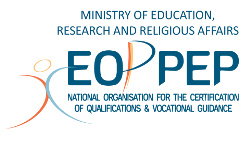PTE General


PTE General English language certification is designed in such a way so as to facilitate people of all ages to learn English as a foreign language. The uniformity of the exam ‘s structure as well as the normal organized and developed course of knowledge make the transition from one level to the other easier. The students are familiarized with the process of learning which contributes to the best comprehension and use of the English language.
PTE General consists of two parts: Written exams that candidates are assessed at Listening, Reading, Writing and an oral examination with an equivalent skill, Speaking. The marking of the written exams is performed in Great Britain whereas the oral exam is marked firstly in Greece or Cyprus from fully trained examiners so as the final mark will be given in Great Britain at the end. In addition, in case of failure, comments are given to each candidate concerning his or her performance at the examination so as to improve themselves to the next one.
The basis for passing the exam is 50% up to Level 4, while 60% is set for the highest level, level 5. Furthermore, according to the percentage that each candidate obtains, the grade is also shown on the certificate as it is presented below:
|
Level A1 |
Level 1 (A2) |
Level 2 (B1) |
Level 3 (B2) |
Level 4 (C1) |
Level 5 (C2) |
|
|
Pass |
50%-59% |
50%-59% |
50%-59% |
50%-59% |
50%-59% |
60%-69% |
|
Merit |
60%-69% |
60%-69% |
60%-69% |
60%-69% |
60%-69% |
70%-79% |
|
Distinction |
70% and above |
70% and above |
70% and above |
70% and above |
70% and above |
80% and above |
PTE General is based on daily scenarios so as students can really express themselves more freely and proving that they are capable of managing their skills in English. Subjects are based on real life daily situations that students experience. Therefore, the exams are placed on the above mentioned situations and not on grammar exercises. The reformed structure of the examination has been created in such a way that makes it briefer without affecting the quality performance of the students.
Furthermore, an adaptation of the process of the exams is also available in case of People with special needs.
Advantages
✓ A complete offsetting of the 4 skills (Listening, Reading, Writing, Speaking)
✓ Same format in all levels
✓ A steady pass percentage of 50% for levels A1, A2, Β1, Β2, C1 and of 60% in C2.
✓ International Recognition by Public and Private Bodies and educational Institutes.
✓ Exceptional circumstances for People with Special Needs.
✓ Plenty of practice tests for the exams
✓ Compositions are guided by bullets from preselected ideas
✓ The candidate may choose one of the two compositions
✓ One candidate during the oral examination
✓ There is no answer sheet. The candidate writes directly on paper.
✓ Available authorized exam centers in Greece and Cyprus.
Format
There are six levels of examination:
|
Levels CEFR |
Levels PTEG |
Duration |
Writing |
Interview |
Listening |
Reading |
|
A1 |
Level A1 Foundation |
75 mins |
2 parts |
5 mins |
3 parts |
4 parts |
|
A2 |
Level 1 Elementary |
95 mins |
2 parts |
5 mins |
3 parts |
4 parts |
|
B1 |
Level 2 Intermediate |
95 mins |
2 parts |
7 mins |
3 parts |
4 parts |
|
B2 |
Level 3 Upper Intermediate |
120 mins |
2 parts |
7 mins |
3 parts |
4 parts |
|
C1 |
Level 4 Advanced |
150 mins |
2 parts |
8 mins |
3 parts |
4 parts |
|
C2 |
Level 5 Proficient |
175 mins |
2 parts |
8 mins |
3 parts |
4 parts |
International Recognition
PTE General is recognized internationally by educational institutions and public services, including ASEP and they are accepted by universities of Greece, Cyprus and universities abroad for bachelor and master level of studies. The exams are accredited by Edexcel, the greatest certification body in the United Kingdom.
Here is the list of the countries where PTE General is recognized by their State Bodies.
|
Country |
Accredited by |
Purpose |
|
Albania |
Ministry of Education and Science |
For completion of post-graduate studies |
|
Colombia |
Ministry of Education |
Approved assessment |
|
Cyprus |
Ministry of Education |
|
|
Czech Republic |
Ministry of Education |
Test of quality |
|
Greece |
Ministry of Education |
ASEP accreditation |
|
Italy |
Ministry of Education |
Test of quality |
|
Lithuania |
Ministry of Education |
Approved accreditation as substitute test for the Valstybinis Brandos Egzaminas(VBE – State Final Examination) |
|
Lithuania |
Lithuanian Ministry of the Interior |
Approved language test for the recruitment of civil servants |
|
Mexico |
Ministry of Education |
Approved assessment |
|
Poland |
Civil Service |
Test of quality for civil servants |
|
Spain |
ACLES – National Association of Language Centres in Higher Education |
Recognised English proficiency tests for entry onto university programmes around Spain |
|
Switzerland |
Canton Lucerne |
Employment purposes for school teachers |
|
Switzerland |
Canton Schwyz |
Employment purposes for school teachers |
|
Switzerland |
Canton St Gallen |
Employment purposes for school teachers |
|
Switzerland |
Canton Zug |
Employment purposes for school teachers |
|
UK |
Ofqual |
Fully accredited by Ofqal as ESOL International qualifications |
|
Ukraine |
Ministry of Education and Science |
Approved accreditation as substitute test to the official school leaving exam, order 1/9-33 |
|
Estonia |
Ministry of Education |
Approved accreditation as substitute test for the Gümnaasiumi Lõpueksamid foreign language examination |











